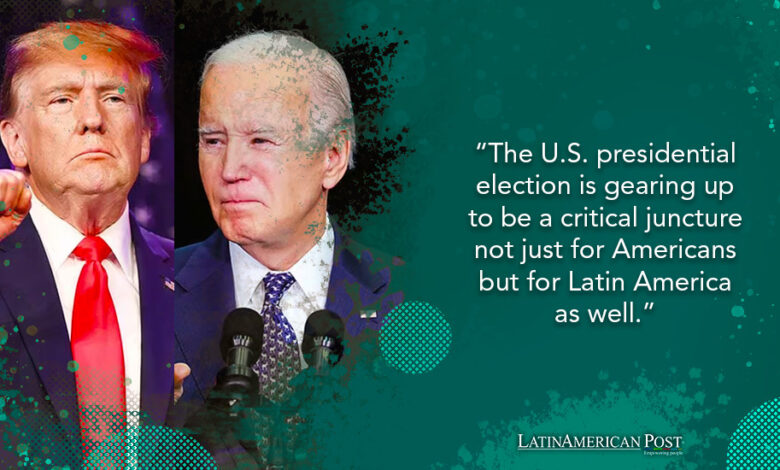Biden vs. Trump: Shaping Latin America’s Migration Future

In the heated run-up to the U.S. presidential election, Biden and Trump’s policies on immigration and border security are under the spotlight. Their differing approaches could significantly impact Latin American countries, influencing migration patterns, bilateral relations, and regional stability.
The U.S. presidential election is gearing up to be a critical juncture not just for Americans but for Latin America as well. The policies of Joe Biden and Donald Trump, particularly concerning immigration and border control, are set to have far-reaching consequences for the region. As both candidates have made recent visits to the border, their actions and rhetoric underscore the high stakes in their potential presidencies. This analysis delves into the consequences of a win for Latin America by either Biden or Trump, providing context and exploring the connection to different Latin American countries.
The U.S.-Mexico border has become a focal point in American politics, emblematic of broader immigration issues, national security, and humanitarian concerns. With 2.5 million undocumented migrants crossing last year, the border’s challenges have escalated, impacting social services in major American cities and straining U.S. relations with Latin American countries. The situation has created a complex interplay of policies and political strategies, with Biden and Trump offering starkly different visions.
Joe Biden’s Approach and Its Implications for Latin America
Joe Biden has attempted to position himself as a leader who is serious about addressing immigration reform while maintaining humanitarian values. His policies, aimed at undoing some of Trump’s stricter immigration measures, suggest a more inclusive and cooperative approach with Latin American countries. A Biden win could signify a shift towards more supportive asylum policies, potentially easing the pressures driving migration from Latin America due to violence, political instability, and economic hardship.
However, Biden’s presidency could also mean continued challenges. The high number of migrants detained under his administration indicates that simply reversing Trump’s policies may not be sufficient to manage the complexities of migration. Furthermore, any perceived leniency in border policies could strain relations with countries struggling to manage their emigration pressures, necessitating a delicate balance between humanitarian concerns and border security.
Donald Trump’s Vision and Potential Impact on Latin America
Donald Trump’s tenure was marked by a hardline stance on immigration, with policies that included the construction of a border wall and stricter asylum rules. His approach has often been criticized for exacerbating tensions with Latin American countries and for policies that have humanitarian implications, such as family separations. A second Trump presidency could reinforce these strategies, potentially leading to increased tensions and further isolating the U.S. from its Latin American neighbors.
Moreover, Trump’s aggressive stance could embolden right-wing governments in Latin America, potentially leading to harsher regional migration controls and affecting regional cooperation. The ripple effects could exacerbate the root causes of migration, such as insecurity and poverty, by limiting the opportunities for international aid and cooperation.
Regional Dynamics and the Role of Other Latin American Countries
The election’s outcome will also resonate beyond the U.S.-Mexico border, affecting U.S. relations with other Latin American countries. Biden’s approach might encourage more collaborative regional efforts to address migration’s root causes, potentially leading to increased U.S. aid and support for development projects. On the other hand, a Trump victory could lead to a more fragmented regional response, with countries possibly adopting more nationalist and isolationist policies in reaction to U.S. policies.
Countries like Guatemala, Honduras, and El Salvador, known as the Northern Triangle, are particularly pivotal. The U.S.’s engagement with these countries can significantly impact migration flows, depending on the support for addressing violence, corruption, and economic disparity. Furthermore, the U.S.’s stance on countries like Venezuela and Cuba could influence political dynamics within the region, affecting migration patterns and diplomatic relations.
The upcoming U.S. presidential election presents two divergent paths for Latin America, each with implications for the region’s countries. Biden’s victory heralded a period of increased cooperation and support, potentially leading to more stable migration patterns and improved U.S.-Latin America relations. Conversely, a Trump win could signify a continuation or intensification of policies criticized for their humanitarian impact and potential to increase regional tensions.
Also read: The US TikTok Ban and its Impact on Latin America
Ultimately, the election’s outcome will determine U.S. domestic policies and shape its foreign relations, especially with Latin America. The region’s countries will closely watch the election, aware that the results will significantly influence their futures, from migration trends to economic opportunities and diplomatic relations. As such, the stakes for Latin America in this election are high, underscoring the interconnectedness of the Americas in the realm of migration and beyond.


